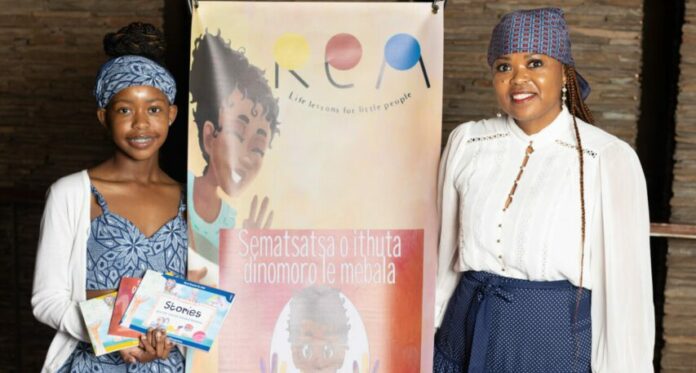Reabetswe Kungwane, the author of a book written in vernacular, believes that children deserve to be given a platform.
The 14-year-old grade 8 pupil from Pretoria recently launched her second book titled Sematsatsa o ithuta dinomoro le mebala (Sematsatsa is learning about numbers and colours).
In an interview with Sunday World this week, Kungwane, who is from the AbaTswana tribe, said she wrote the book in SePedi because she wants people to learn African languages and to preserve them for generations to come.
“This is a story about a girl who is struggling to learn a language, so she figures that it will be easier for her to learn the language through numbers and colours,” she shared.
“I wrote this story because it is important for Africans to know African languages, however, my main aim is to preserve indigenous languages through books, because if you look closely these languages are slowly fading.”
She said her passion for writing stems from her love of reading, and for her book to come to life, she had to familiarise herself with Pedi-speaking people and study their culture to avoid introducing mistakes.
“I detected a lack of representation within the authors industry, because all the books that I would read were written by older people, and they were talking about old people issues. Older writers have no idea about the things that children go through on a daily basis, and yet there are a lot of children with the writing talent, they just do not know what to do with their talent.
“I would consider myself one of the lucky ones, because I received a lot of support from my mother, school and friends. My teachers bought my books and displayed them at the library.
“My mother made me love writing more, because she showed interest in my work. Underprivileged children do not have access to as much information and do not get the support they need,” she said.
Avid storyteller Gcina Mhlophe reiterated that children do not get the necessary platforms.
“Children need to go to school, education will help them to not be gullible to publishers who want to make more money through them. The issue of royalties is one of the biggest struggles for writers,” Mhlophe said.
“I would not say that schools are a conducive environment to nurture children writers, but I am positive that it will grow, because unlike old people who always consider a lot of things before acting on their crafts, children are fearless.”
She further advised that schools should have writing clubs where children gather, read each other’s work and sharpen their writing skills.
“It does not have to be a big writing club, that way it will be easy to track the progress of each child, because there is no platform that is made for them. Children writers are always mixed with old writers at events, which makes it difficult for them to thrive.”
Follow @SundayWorldZA on Twitter and @sundayworldza on Instagram, or like our Facebook Page, Sunday World, by clicking here for the latest breaking news in South Africa. To Subscribe to Sunday World, click here.




Thank you for your sharing. I am worried that I lack creative ideas. It is your article that makes me full of hope. Thank you. But, I have a question, can you help me?
Thank you for your sharing. I am worried that I lack creative ideas. It is your article that makes me full of hope. Thank you. But, I have a question, can you help me? https://accounts.binance.info/lv/register-person?ref=SMUBFN5I